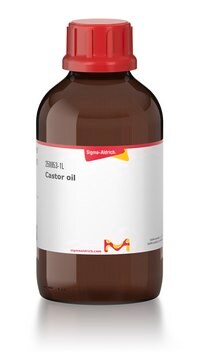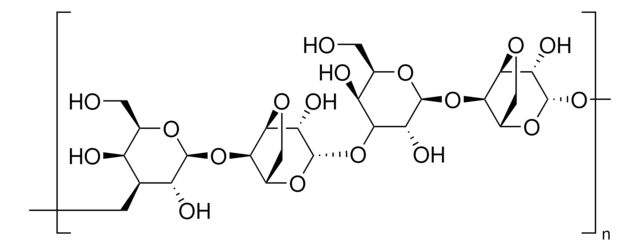S8281
Safflower seed oil from Carthamus tinctorius seed
Faça loginpara ver os preços organizacionais e de contrato
About This Item
Produtos recomendados
fonte biológica
plant seeds (Carthamus tinctorius)
Formulário
liquid
índice de refração
n20/D 1.476 (lit.)
densidade
0.921 g/mL at 25 °C (lit.)
grupo funcional
carboxylic acid
oleic acid
tipo de lipídio
oils
Condições de expedição
ambient
temperatura de armazenamento
room temp
Procurando produtos similares? Visita Guia de comparação de produtos
Categorias relacionadas
Aplicação
<ul>
<li><strong>Anti-osteoporosis effects of mammalian lignans and their precursors from flaxseed and safflower seed using zebrafish model:</strong> The study investigates the potential health benefits of safflower seed oil in preventing osteoporosis, highlighting its utility as a dietary supplement (Yang et al., 2023).</li>
</ul>
<li><strong>Anti-osteoporosis effects of mammalian lignans and their precursors from flaxseed and safflower seed using zebrafish model:</strong> The study investigates the potential health benefits of safflower seed oil in preventing osteoporosis, highlighting its utility as a dietary supplement (Yang et al., 2023).</li>
</ul>
forma física
Raw oil without preservative
Código de classe de armazenamento
10 - Combustible liquids
Classe de risco de água (WGK)
awg
Ponto de fulgor (°F)
Not applicable
Ponto de fulgor (°C)
Not applicable
Equipamento de proteção individual
Eyeshields, Gloves
Escolha uma das versões mais recentes:
Já possui este produto?
Encontre a documentação dos produtos que você adquiriu recentemente na biblioteca de documentos.
Young Taek Oh et al.
Physiology & behavior, 167, 194-201 (2016-10-25)
Previous rodent studies showed that when injected into the brain, free fatty acids (FFAs) reduced food intake in an oleate-specific manner. The present study was performed to test whether food intake is regulated by circulating FFAs in an oleate-specific manner.
Takeshi Arai et al.
The Journal of nutritional biochemistry, 24(1), 267-273 (2012-08-21)
We investigated the effects of dietary fat energy restriction and fish oil intake on glucose and lipid metabolism in female KK mice with high-fat (HF) diet-induced obesity. Mice were fed a lard/safflower oil (LSO50) diet consisting of 50 energy% (en%)
Christopher M Mulligan et al.
Cardiovascular research, 94(3), 460-468 (2012-03-14)
Cardiolipin (CL) is a tetra-acyl phospholipid that provides structural and functional support to several proteins in the inner mitochondrial membrane. The majority of CL in the healthy mammalian heart contains four linoleic acid acyl chains (L(4)CL). A selective loss of
R A Gibson et al.
Prostaglandins, leukotrienes, and essential fatty acids, 88(1), 139-146 (2012-04-21)
The conversion of the plant-derived omega-3 (n-3) α-linolenic acid (ALA, 18:3n-3) to the long-chain eicosapentaenoic acid (EPA, 20:5n-3) and docosahexaenoic acid (DHA, 22:6n-3) can be increased by ALA sufficient diets compared to ALA deficient diets. Diets containing ALA above an
K G Lamping et al.
Diabetes, obesity & metabolism, 15(2), 144-152 (2012-09-07)
The ability of dietary enrichment with monounsaturated fatty acid (MUFA), n-3 or n-6 polyunsaturated fatty acids (PUFAs) to reverse glucose intolerance and vascular dysfunction resulting from excessive dietary saturated fatty acids is not resolved. We hypothesized that partial replacement of
Nossa equipe de cientistas tem experiência em todas as áreas de pesquisa, incluindo Life Sciences, ciência de materiais, síntese química, cromatografia, química analítica e muitas outras.
Entre em contato com a assistência técnica





